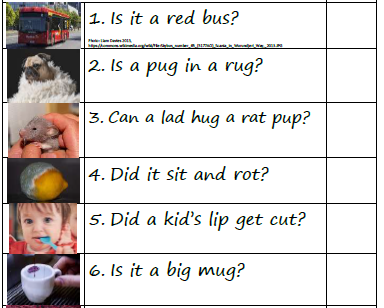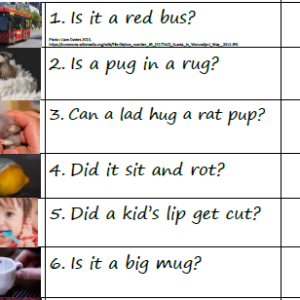Initial Code Quizzes sampler
$AUD0.00
These 10 decodable quizzes for beginning and struggling readers each contain ten Yes/No questions. Try them out by downloading the file and printing what you need for your learners on A4 paper, before deciding whether to get the whole set of 100.
The quizzes provide sentence-level reading practice for phonics lessons. They are for learners working at an earlier level than the Phonics With Feeling Initial Code readers.
The quizzes follow the same teaching sequence as the Sounds Write program’s Initial Code Units 1-10, the early Phonic Books and the Forward With Phonics resources. See below for more details.
Description
These 10 free sample decodable quizzes for beginning and struggling readers each contain ten Yes/No questions. Try them before you decide whether to get the whole set of 100 quizzes. This is a downloadable file you download and print on A4 paper.
The quizzes provide sentence-level reading practice for phonics lessons. They are for learners who aren’t yet up to the Phonics With Feeling Initial Code readers, also available on this website.
The quizzes follow the same teaching sequence as the Sounds Write program’s Initial Code Units 1-10, the early Phonic Books and the Forward With Phonics resources:
| Unit | New sound-spelling relationships, word structures & morphemes | Example words | Number of quizzes |
| 1 | a, i, m, s, t, in VC and CVC words | am, sit | 2 |
| 2 | n, o, p | on, pat | 10 |
| 3 | b, c, g, h | big, cat, hop | 10 |
| 4 | d, e, f, v | fed, vet | 10 |
| 5 | k, l, r, u | kid, leg, run | 10 |
| 6 | j, w, z | jam, win, zip | 10 |
| 7 | x, y, ff, ll, ss, zz | box, yes, off, well, kiss, buzz | 10 |
| 8 | VCC and CVCC words, plural -s, past -ed | end, help, cats, dogs, puffed, fanned | 12 |
| 9 | CCVC words | stop, grab, frill | 10 |
| 10 | Up to CCCVCCC words | frost, strum, scrimps, bumped, stressed | 16 |
Reading, remembering and understanding one sentence at a time can be less daunting than tackling a whole book. Most children enjoy competitions, just as most adults enjoy trivia nights.
Because all questions have Yes/No answers, children have a 50-50 chance of getting each one right. Right/wrong answers are not the pedagogical point. The point is to motivate learners to decode. There is no answer key, so the teacher can adjudicate on any disputed answers, appoint a panel of students to make this decision, or go with the majority view on a show of hands. We (being Speech Pathologists) hope the questions prompt learners to ask questions, have discussions and argue for alternatives.
Until halfway through Unit 8, all questions include a picture. After that, slightly less than half are text-only. All pictures are from the public domain and we’ve donated to Creative Commons to say thanks, and will do so again if they sell well.
It’s difficult to write decodable text, because literate adult brains always tend to focus on meaning. It takes phonics expertise and mental discipline to also focus on structure. The Spelfabet team – Adrianna Galioto, Renee Vlahos, Maria Narouz, Roshni Kaur, Laura McCormack, Tessa Weadman and Alison Clarke – have all worked on these quizzes. We hope they help beginning and struggling readers to accurately sound words out, not memorise and guess them.
The purchaser of these quizzes may make copies for their own students/clients.





